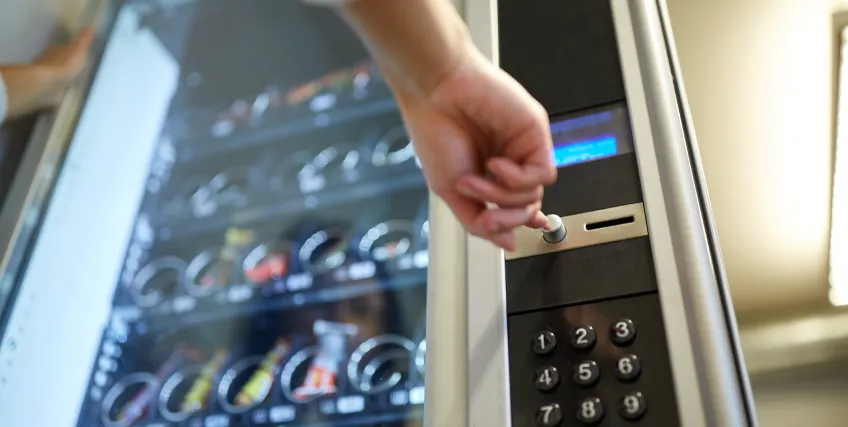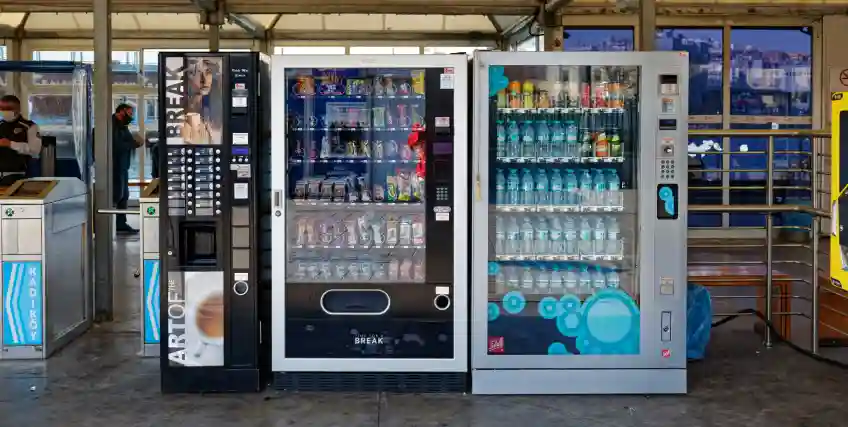4 Popular Business Loan Options for Vending Machine Operators in 2026
Aug 14, 2025 | Last Updated on: Aug 18, 2025

Running a vending machine business can be a great way to earn passive income with relatively low overhead. Despite the simplicity of this business model, though, it also comes with many upfront and ongoing costs for entrepreneurs, including purchasing vending machines, restocking inventory, maintaining equipment, and expanding to new locations.
Understanding your vending machine financing options is essential to long-term business success. Whether you’re considering founding a startup or expanding an already-successful route, choosing the right financing product can help you manage cash flow and scale effectively. If you’re wondering how to finance a vending machine business, here are the top four vending machine financing options to consider and how to match your business needs with the right funding solution.
1. Business Line of Credit
The first small business vending machine funding option to consider is a business line of credit. This product provides access to a revolving pool of funds to draw from as needed, without having to submit a new application or wait for approval from a lender. Whether you want to buy new vending equipment or need to handle an emergency expense that arises, a business line of credit is ready and on-demand.
Unlike a traditional loan, you will only pay interest on the amount of your line of credit that you use. As you repay any outstanding balance, the credit line replenishes. This makes it a versatile vending machine financing option for operators who need flexible funding, and anyone who may need to borrow more than once.
Here are some of the benefits and drawbacks to using a business line of credit as a vending machine financing option.
Pros
- You’ll have revolving access to funds: If approved, you can draw from your credit line as needed and reuse it as you repay. This makes it perfect for businesses with fluctuating inventory needs or unpredictable snack vending machine maintenance issues.
- Only pay interest only on what you use: Unlike lump-sum loans, you won’t accrue interest on the full approved amount of your line of credit. You’ll only pay finance charges on what you actually borrow (though there may be annual fees and other expenses to note).
- You’ll get flexible cash flow management: You can borrow smaller amounts more frequently with a line of credit, making it an ideal vending machine financing option for restocking vending products or topping off cash reserves for technician services or route gas.
- It improves as you use it: Over time, as you build a history of responsible borrowing and repayment, lenders may improve your financing terms, such as increasing your credit limit or lowering your interest rate.
Cons
- It may require a strong credit history: Lenders will often look for a healthy business credit score (600+), established revenue, and a few years’ history in business before approving business owners for a line of credit.
- Your fees can add up: Some lenders will charge annual maintenance fees, draw fees, or inactivity fees that can reduce the cost-effectiveness of this vending machine financing option. Even if you don’t pull from the line of credit, it may still cost you.
- There might be the temptation to over-borrow: Having easy access to on-demand funds can lead to unnecessary spending if it’s not carefully managed. Just because you can use your line of credit to buy brand new vending machines doesn’t necessarily mean you should.
- There are usually variable interest rates: Depending on the lender, rates on a business line of credit can often fluctuate. This will impact your borrowing costs and can even result in flexible payments that change over time.
2. Short-Term Business Loans
A short-term small business loan provides business owner borrowers with a lump sum of capital that they can use for any number of purposes, whether to cover upfront costs of starting their business, paying employees, covering the cost of new drink vending machines, or anything in between.
These loans are set to be repaid over short repayment schedules. They are often structured with fixed interest rates and often come with lower costs than other vending machine financing options.
Here are some of the upsides and drawbacks of using short-term business loans as part of your overall financing plan.
Pros
- They’ll give you quick access to funds: Approval and funding for a short-term business loan can sometimes occur quickly, especially if you’re able to submit an online application. This makes them a practical choice for restocking popular products, repairing broken machines, or seasonal scaling, when you may need cash fast.
- There are fixed repayment terms: Having predictable weekly or monthly payments will help with budgeting, and you always know what the total cost will be for this form of debt.
- They’re versatile: Short-term business loans can be used for a wide range of needs: working capital, marketing, staff hiring, expansion, or inventory.
- You may be able to build your credit history: Many lenders will report your loan status and payment history to the business credit bureaus, helping you build or strengthen your business credit profile.
Cons
- They often have higher interest rates than long-term loans: Short-term loans are riskier than traditional long-term loans. Due to this shorter repayment period and higher level of risk, interest rates can be steep — sometimes in the double digits.
- Repayment schedules are frequent: Business owners are required to make smaller but more frequent payments on their short-term loans, which sometimes means weekly or even daily. This can limit how much of this vending machine financing option you’re able to actively use for your business.
- Loans have shorter terms: Loan periods are often capped at 18 months for short-term business loans, which might not suit businesses with longer ROI cycles.
- Qualification requirements vary: Some lenders may still require a decent credit score, demonstrated time in business, or monthly revenue minimums before approving you for this vending machine financing option.
3. Equipment Financing
Equipment financing is one vending machine financing option specifically designed for purchasing new or used vending machines. In this case, the equipment itself typically serves as collateral for the debt, lowering the lender’s risk and making it easier for borrowers to qualify, even if their credit isn’t perfect.
Equipment financing may be presented as in-house financing or even in combination with leasing options that offer a buyout in the end.
Here’s what you need to consider.
Pros
- They’re targeted for equipment purchases: Funds from equipment loans can only be used for purchasing or leasing specific equipment, like buying combo vending machines. This makes the loan process streamlined and purpose-specific.
- The equipment secures the loan: Because the vending machine serves as collateral, this reduces the risk for the lender and can result in lower interest rates or more lenient credit requirements.
- Cash flow is preserved: This vending machine financing option allows you to acquire high-cost vending machines without paying the full amount upfront. Doing so preserves your working capital for other needs.
- There are tax benefits: Depending on your location and accounting method, you may be able to deduct depreciation or lease payments as a business expense.
Cons
- Use of funds may be restricted: You can’t use equipment financing to cover other expenses, like inventory, route expansion, or other operational needs. These can only be used to buy the equipment that secures the debt.
- Down payments are often required: Many lenders require a 10% to 20% down payment for these vending machine financing options, especially for newer operators or larger machines.
- Risk of repossession: If you default on your debt, the lender can choose to seize the machine as a way of recovering their loss.
- You’re limited for software and/or upgrades: Equipment loans may not cover any technology upgrades or software features that can (or need to) be added post-purchase.
4. SBA Loans
SBA loans are government-backed business loans offered by lenders approved through the Small Business Administration (SBA) While these tend to have the most favorable loan rates and repayment terms, they also come with some of the strictest qualification requirements and longest approval timelines, so they aren’t an option for borrowers who need cash now.
Popular vending machine financing options through the SBA include:
- SBA 7(a) Loans: Up to $5 million can be used for equipment, inventory, or expansion.
- SBA Microloans: Ideal for small loan amounts up to $50,000.
Here are the pros and cons to note.
Pros
- Interest rates are low: SBA loans typically offer rates lower than most private lenders because they are partially guaranteed by the government.
- Long repayment terms make them flexible for businesses: SBA 7(a) loans can stretch up to 10 years (or longer for real estate), making them a suitable vending machine financing option for long-term growth or refinancing existing high-interest debt.
- There’s flexibility to use them as needed: SBA loan funds can be used for equipment, working capital, real estate, hiring, or even acquiring another vending route.
- They’ll give you a credit boost: Successfully securing and repaying an SBA loan can significantly enhance your business credit profile and reputation.
Cons
- There’s a lengthy application process: SBA loans can take weeks or even months to go from application to funding. That makes this vending machine financing option too slow for urgent business needs like machine breakdowns or time-sensitive restocking.
- Documentation requirements can be extension: To qualify for an SBA loan, you’ll need to provide everything from financial statements to business plans, tax returns, and more.
- Qualification criteria is tight: SBA loan approval requires strong personal and business credit, sufficient time in business, and sometimes collateral or a personal guarantee.
- There are loan caps and fees: SBA microloans max out at $50,000, which may be insufficient for large expansion projects or big equipment purchases. In some cases, closing costs and guarantee fees may also apply.
Final Thoughts
Finding the right vending machine financing option depends on your business goals, timeline, and even your individual financial situation. If you need fast funding for emergencies or inventory, a merchant cash advance or short-term loan can help — though they’re usually more expensive. For recurring expenses or a financial safety net, a business line of credit offers flexible access to capital. And if you're buying or upgrading machines, consider equipment financing. And for long-term growth with favorable terms, SBA loans are worth exploring if you qualify.
The key is to match your funding to your business’s cash flow and needs. Review your goals, understand repayment terms, and compare vending machine financing options before committing.
With the right financing in place, you can keep your vending machines stocked, functional, and profitable—whether you’re just getting started or ready to expand.
FAQs on Vending Machine Financing Options
How do I finance a vending machine with bad credit?
You may still qualify for a merchant cash advance or equipment loan, even if you have bad or limited business credit, as these rely more on sales or collateral than your credit score and history. Some alternative lenders also offer short-term loans to borrowers with lower credit.
Can I get a loan to buy vending machines specifically?
Equipment financing is designed for purchasing business equipment like vending machines. The machines then typically serve as collateral to secure the debt, which can make it easier to qualify and snag lower interest rates with these vending machine financing options.
How much money do I need to start a vending machine business?
Startup costs for a vending machine business can range. Financing these expenses can help cover machine purchases, setup, restocking, and route costs.
Are SBA loans a good option for vending businesses?
SBA loans offer low interest and long terms but take time and paperwork. They’re best for established operators planning large-scale expansion, equipment purchases, or hiring, whereas traditional loans, equipment financing, or MCAs may be better for businesses needing cash sooner.
Can I use financing to restock vending machine inventory?
You may use the funds from short-term loans, merchant cash advances, or lines of credit to restock inventory. Lines of credit are especially useful for recurring restocking needs.
Frequent searches leading to this page
Term Loans are made by Itria Ventures LLC or Cross River Bank, Member FDIC. This is not a deposit product. California residents: Itria Ventures LLC is licensed by the Department of Financial Protection and Innovation. Loans are made or arranged pursuant to California Financing Law License # 60DBO-35839




